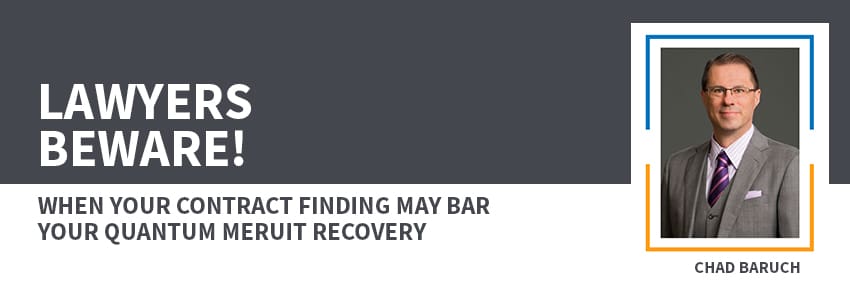
Lawyers frequently plead and litigate breach-of-contract cases on alternate claims for breach and for quantum meruit. Often, they submit questions on both claims to the jury. And there may be good reasons to do so. But lawyers (and their clients) should be mindful of the circumstances under which the jury’s findings on the contract claim will bar recovery in quantum meruit.
Quantum meruit is an equitable theory of recovery based on an implied contract to pay for benefits received. Bashara v. Baptist Mem’l Hosp. Sys., 685 S.W.2d 307, 310 (Tex. 1985). The presence of an express contract generally bars recovery under quantum meruit. In re Kellogg Brown & Root, Inc., 166 S.W.3d 732, 740 (Tex. 2005). Thus, a party generally cannot recover under quantum meruit, “when there is a valid contract covering the services or materials furnished.” Celmer v. McGarry, 412 S.W.3d 691, 708 (Tex. App.—Dallas 2013, pet. denied) (citations omitted).
The Texas Supreme Court has recognized only three exceptions to the general rule that an express contract bars recovery under quantum meruit.
- First, “recovery in quantum meruit is allowed when a plaintiff has partially performed an express contract but, because of the defendant’s breach, the plaintiff is prevented from completing the contract.” Truly v. Austin, 744 S.W.2d 934, 936 (Tex. 1988). Substantial performance is a condition precedent to recovery under an express contract. Murray v. Crest Const., Inc., 900 S.W.2d 342, 345 (Tex. 1995). This exception relates to a plaintiff’s inability to recover under contract because of a failure of this condition precedent due to a breach preventing performance.
- Second, “[r]ecovery in quantum meruit is sometimes permitted when a plaintiff partially performs an express contract that is unilateral in nature.” Truly, 744 S.W.2d at 937.
- Finally, a breaching plaintiff in a construction contract can recover the reasonable value of services less any damages suffered by the defendant if the defendant accepts and retains “the benefits arising as a direct result of the [plaintiff’s] partial performance.” Id. “[A]bsent an applicable exception, the general rule is that the presence of an express contract bars recovery under quantum meruit.” Pepi Corp. v. Galliford, 254 S.W.3d 457, 463 (Tex. App.—Houston [1st Dist.] 2007, pet. denied).
So how can parties find themselves out of luck based on these rules? One example is found in the decision in Houston Medical Testing Services, Inc. v. Mintzer, 417 S.W.3d 691 (Tex. App.—Houston [14th Dist.] 2013, no pet.). There, the jury found a valid contract existed but the defendant did not breach it. The jury awarded the plaintiff recovery in quantum meruit. The court of appeals reversed, holding that “[b]ecause a contract covered the services at issue, the [plaintiff] cannot recover in quantum meruit. Instead, the contract defines the [plaintiff’s] rights.” Id. at 696.
Another example is in Christus Health v. Quality Infusion Care, Inc., 359 S.W.3d 719 (Tex. App.—Houston [1st Dist.] 2011, no pet.). In that case, the court’s charge included questions both for breach of contract and quantum meruit. Id. at 723. The jury awarded recovery only in quantum meruit. Id. at 722. The court of appeals reversed, holding that the jury’s implied finding of a contract barred recovery in quantum meruit as a matter of law. Id. at 725.
The real danger is that in these situations, the appellate courts impose tak-nothing judgments. That is precisely what the Houston court did in Mintzer—concluding that because the jury’s findings precluded recovery for breach of contract, and the plaintiff did not challenge those findings on appeal, “the [plaintiff] should take nothing.” Mintzer, 417 S.W.3d at 696 (citations omitted). Other courts have reached the same result. See, e.g., Kittyhawk Landing Apts. III v. Anglin Constr. Co., 737 S.W.2d 90, 94 (Tex. App.—Houston [14th Dist.] 1987, writ ref’d n.r.e.); Gulf Liquids New River Project, LLC v. Gulsby Engineering, Inc., 356 S.W.3d 54, 71 (Tex. App.—Houston [1st Dist.] 2011, no pet.).
None of this means that you cannot assert and pursue claims for breach of contract and quantum meruit. But it does mean that you must be careful in the submission of those claims to the jury, and in understanding the effect of the jury’s answers on each claim.
